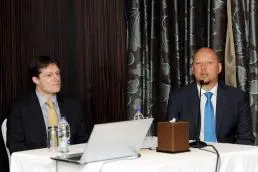PHOTO
Iran nuclear deal post Implementation Day "does not mean trade sanctions are over" but Iranian market potential remains considerable
Dubai - As part of its ongoing series of guest speaker lectures, Capital Club, Dubai's Premier Private City Club and member of the ENSHAA group of companies, recently welcomed global regulatory policy and capital markets specialist, Iain Stewart-Linnhe, for a talk on the geo-financial risks and opportunities for foreign investment, transactions and trade with Iran.
In the aftermath of the Joint Comprehensive Plan of Action (JCPOA), reached in Vienna on 14 July 2015 between Iran and the P5+1, the so-called "nuclear deal" has led many to see this as a door opening to other investment opportunities. However, according to Stewart-Linnhe, there remain many hurdles ahead before businesses and investors can seriously look at the clear opportunities in one of the world's largest untapped global markets.
Capital Club is a private city club that boasts Members including UAE government officials and some of the most senior executives in the country's private sector industries. Many of whom were in attendance to hear Stewart-Linnhe's expert opinion on the challenges that investors still face.
Stewart-Linnhe's talk, entitled "Geo-financial risk or opportunity in an era of major global policy change?". From the outset, he made it clear that all the talk about the Iranian market opening up has nothing to do with the non-nuclear related sanctions which remain in force. And this is fundamental to contextualising business and investment opportunities.
Stewart-Linnhe further defined the geo-financial risks as remaining in areas relating to transactional issues and the risks associated with partnering with shell organisations identified on sanctions lists. That is to say, investors need to do their due diligence in order to have a better understanding of the origin and direction of the flows of funds within their business partners' companies - not just their own.
"After 9/11 there has been a different set of [legal] circumstances with very real impact in terms of sanctions and jurisdictional practices extending into other territories and on individuals. This has resulted in companies being on the terrible end of a situation of not knowing which jurisdiction has control and which doesn't. This is key to understanding how the Iran nuclear deal is going to work [and subsequently any form of business dealings with Iranian companies]," said Stewart-Linnhe.
Stewart-Linnhe further outlined the current risk and opportunities that remain and the steps companies should "reasonably" be seen to take, from a legal standpoint. As well as stressing the importance of having the right advisors and specialists on-board in this process.
In terms of the risks, Stewart-Linnhe identified areas such as: sanctions on entities, individuals, illicit activities, and entity nexus; internal and external conflicts; due diligence; sanctions databases; existing and illegal practices; outdated practices; and incompatible commercial links.
A key element to managing the risk factors was highlighted as ensuring companies or their advisors take it upon themselves to do their due diligence and maintain the highest standards of practice. As the legal mechanisms in Iran remain immature, compared to international markets, the onus is still on companies looking to do business with Iran to show within all "reasonableness" that they have taken all measurable precautions and sought adequate advice. Stewart-Linnhe suggested that companies should also prepare to lobby governments and institutions, like OFAC, in order to demonstrate clear cases of purely legitimate commercial activity.
On a positive note, Stewart-Linnhe suggested that with the various risk factors taken into account, there are many opportunities to explore within the Iranian market that may lie outside of sanctioned activities. These were identified as commercial interests in: Tourism and Hotels; Real Estate; Transport; Automotive; Aviation; Pharmaceuticals and Healthcare; Oil and Gas; Foodstuffs; Retail; Financial Services; Agriculture; Green Energy; Education; and Sport.
An honorary lecturer to Masters in Law graduates at the University of Liverpool, UK, Stewart-Linnhe is a senior UK regulatory professional, academic and former executive director of a major European investment bank. Stewart-Linnhe is in charge of a leading global regulatory, compliance, and capital markets advisory Stewart Linnhe - Smarter response to regulation. Stewart-Linnhe specialises in cross-border regulatory initiatives affecting GCC capital markets, as well as global regulatory reform, extra-territoriality, sanctions, geo-financial risk and its impact on financial services and industry in general.
-Ends-
About Capital Club Dubai: www.capitalclubdubai.com
Capital Club is Dubai's Premier Private City Club situated in the heart of the city's financial district - DIFC. A Members-only club in a contemporary setting for members to network professionally; dine and socialise; host private meetings; and attend a wealth of social and business events; the Club is connected to over 250 premier private clubs around the world as part of its reciprocal club network. Capital Club Dubai is majority owned by Signature Clubs International, a member of the ENSHAA group of companies. As the developer and operator of the Capital Club brand, SCI has over 30 years experience in developing, launching and operating high-end private clubs in the Middle East, Europe and Asia. Its portfolio includes existing Clubs in Dubai, Bahrain and Nairobi, with upcoming initiatives planned in MENASA, Europe and the US, as part of a major five-year global roll out programme.
For more information, please contact:
Carmen Audino
Sahara Communications
Mob: +971 55 456 3251
Email: carmena@saharagcc.com
© Press Release 2016




















